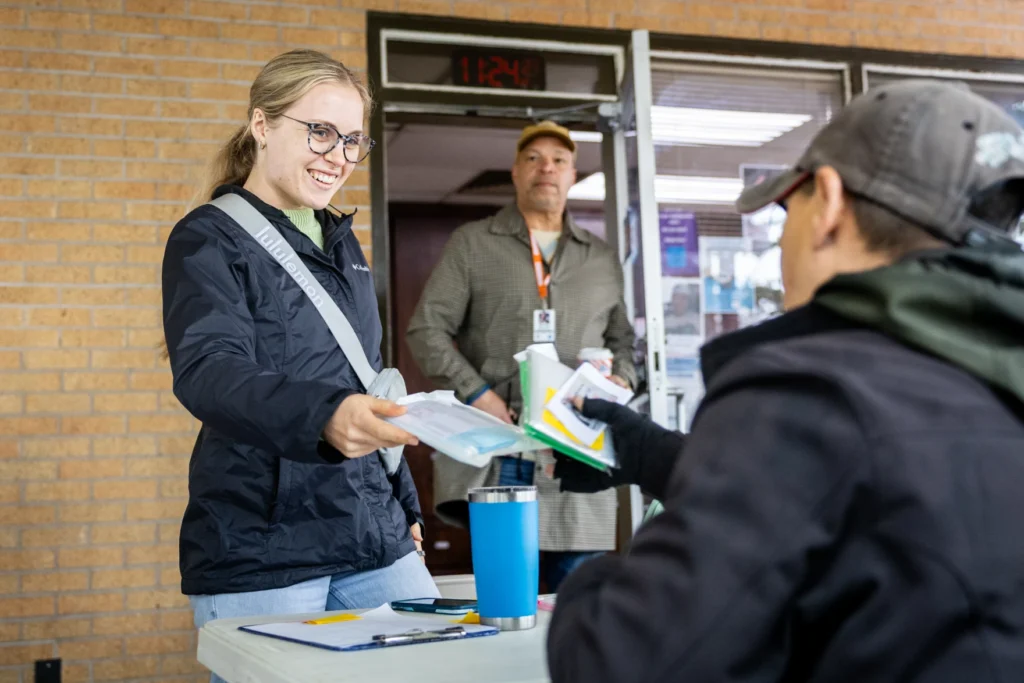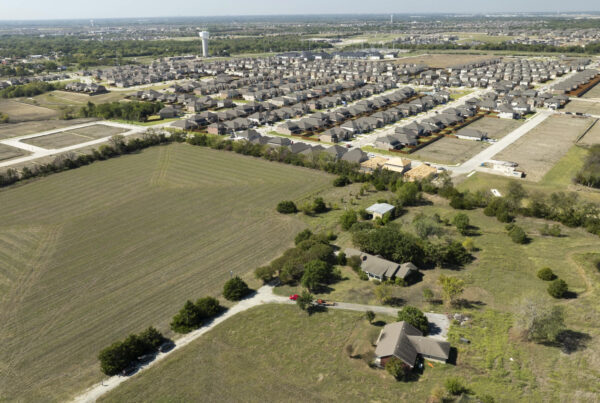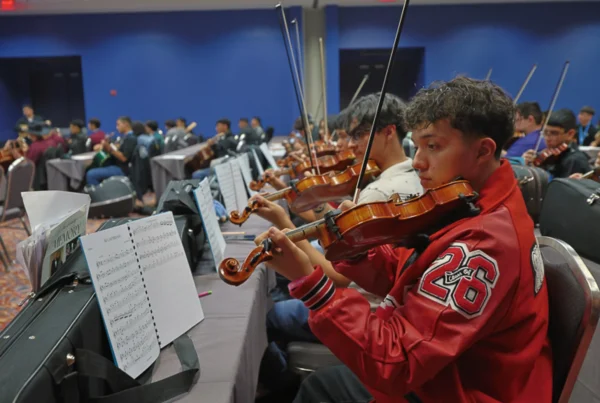From KUT News:
After a stint in the Army, Chad Young was homeless, living in his car, sleeping wherever police or security guards wouldn’t bother him. For five years, he tried calling every number he could to get help – 311, 211, the VA hotline – but got nothing.
Then, finally, someone answered.
“I really couldn’t believe what was happening. I was almost positive that I was going to die on the streets, that my country had forgotten about me and my community had forgotten about me. My family had forgotten about me,” he said. “Then this little church … out in South Austin, they actually helped me.”
Sunrise Homeless Navigation Center got him connected with housing within two weeks. He has a job now and is stable.
Young is one of the thousands of Austinites who sought out services from the nonprofit. Housed in an unsuspecting corner-lot church off Menchaca Road, the center is the largest homeless service provider in Travis County. On any given day, it provides more services – warm meals, clothes, connections to housing and health care – than the City of Austin and Travis County.
The daily services are a magnet for some of the most vulnerable Austinites. And over the past few years, neighbors argue, it’s also become a magnet for drug use and dangerous behavior.
This month, Attorney General Ken Paxton sued to shut down the nonprofit, arguing it’s a nuisance to the neighborhood and Joslin Elementary across the street. As the nonprofit prepares to meet Paxton in court, it says it wants to find a solution with the community.
Under the microscope
Nannette Rauth is one of the hundreds of homeless Austinites who visit the church every other day – whether it’s to get a warm meal or to pick up mail.
“It’s an awesome place,” she said as she was getting a copy of her driver’s license. “I mean, they help you with everything.”
Rauth has been connected with housing services through Sunrise before. After an eviction, she’s working with it again to find an apartment.
But the chorus of concerns from neighborhood groups has been deafening over the last few years. That’s laid out in Paxton’s case – nearly 600 pages, with reams of police reports and sworn statements from residents and nearby business owners. Allegations of harboring and hiring criminals. Anecdotes of a client wielding a machete (more than once). Needles found on Joslin Elementary’s playground. An attempted break-in at Joslin during school hours.

Hannah Smith, an assessor with Sunrise Homeless Navigation Center, hands a mask to a client.
Michael Minasi / KUT News
Paxton also takes issue with the fact that Sunrise receives money from the City of Austin and Travis County.
“While Sunrise is enriched, local residents and businesses pay a steep price,” his lawsuit reads.
Mark Hilbelink, who heads up Sunrise and is pastor of the Sunrise Baptist Church, said that money came with strings. The nonprofit is regularly audited and monitored to ensure it’s not grifting Travis County taxpayers.
“The beauty [of] being so connected is that we are constantly under the microscope. We are audited. Our performance is constantly checked,” he said. “It’s something that we are used to.”
No place to go
Dale Herron, president of the Western Trails Neighborhood Association, said he normally doesn’t side with Paxton. But because of the activity around Sunrise for the last decade – and a lack of movement on addressing neighborhood concerns – he supports the lawsuit, which aims to shut Sunrise down for a year.
Herron said he appreciates what the center and Hilbelink are trying to do, but things have gotten out of hand.
“Defecating in our parks, masturbating, nudity, public intoxication, battery, breaking into homes, stealing, those things are obviously breaking the law,” Herron said. “But homelessness, we understand, is not. It’s the things that they do while they’re homeless in our neighborhoods – that’s the problem.”
Hilbelink said Sunrise has been working with the community to clean up the area surrounding the church and mitigate some of the behavior that spills over into the elementary school and nearby Joslin Park. He points at a Valero across Menchaca, where someone was clearing out trash, likely from one of Sunrise’s clients.
Hilbelink admits there have been issues at Joslin and the park, but he says framing that pits the school against the center isn’t accurate. Some of the center’s clients are students at the school.
“One of the things that was hardest for me to read in the lawsuit was this kind of trying to set Sunrise up against the school and against the Austin school district,” he said. “The reality is that over a thousand children have already been certified as homeless in Austin ISD just this year, and the vast majority of those are referred directly to Sunrise.”
Austin ISD wouldn’t comment on the lawsuit, but in a statement it said the district is “committed to continued collaboration with our neighbors, ensuring those who need support can get what they need while prioritizing our student learning.”
Herron said Hilbelink should have known this wasn’t a good spot to provide homeless services. Joslin Elementary has been there since 1956.
“When it started it was small numbers of people, but now it has become what it is today,” he said. “They’re serving hundreds of people a day … and they have no place to go.”
The trade-off
Travis County Constable Stacy Suits, who was stopping by Sunrise that day, served three terms as constable in the ’80s, then ran for office again in 2016 and recently won reelection.
For years, Suits said, encampments have persisted in South Austin near Sunrise, but the city and county have “played whack-a-mole with the population.” Encampments crop up, cops clear them out and people go somewhere else.
“There’s a trade-off,” he said. “If you keep moving people, you’re driving them deeper in the woods. It’s harder to make contact and to get service to them.”
Suits said the lawsuit – and the outrage surrounding it – is “misdirected,” and that the state should prioritize the underlying issue: mental health care. In the ’80s, he said, it was possible for law enforcement officers to get a person committed for mental health reasons if they were a danger to themselves or the neighborhood. Now, state hospitals are full.
“The guy that was running around here with a machete, we picked him up twice and did a mental commitment,” he said. “The fact of the matter is … there’s not enough bed space in the mental health system to keep people. So … the state needs to step up and greatly expand the state mental hospitals, period, and provide adequate long-term care the way they used to.”
Shouldering the burden
Hilbelink said the lawsuit is similar to Paxton’s attacks on faith-based groups providing aid to migrants along the border and that it’s had a chilling effect on service providers.
“If Ken Paxton can sue a church for helping the homeless, who can’t he sue?” he said.
Hilbelink said suing isn’t a solution to a growing problem: Austin’s homeless populationhas nearly doubled since 2018.
And, he said, it further complicates the work done by people in homeless services, who are largely volunteers. For years, he said, communities have been more than happy to see this work done for free. Now, service providers are a political target.
“This entire system would not work if it wasn’t for these churches voluntarily shouldering the load,” he said. “To go after those people who are shouldering the heaviest part of the homelessness load, for free, makes zero sense.”
Hilbelink said he will offer Sunrise’s side of the story at a hearing slated for early next year.
But Rauth said she understands where the neighbors and nearby businesses are coming from. There is a lot of activity near Sunrise – some of it criminal. She gets why folks may want it moved.
“They’re … good people, it’s just who they’re serving that’s the problem,” she said. “I don’t think it’s the helpers. I don’t think they should be sued at all.”
Young said he hopes Sunrise keeps shouldering the burden, despite the lawsuit. He hopes people work together to solve the issue – talking it out in person and not in a courtroom. Those conversations should include Austinites like him, he said, who need help getting back on their feet. He said his life is in order now, and he has Sunrise to thank for that.
“Ken Paxton never helped me. Ken Paxton never reached out and helped me, a veteran,” he said. “All of these these resources that told me …’If you’re a veteran, we’ll get you off of the streets.’ Not a single one of them could help me.”















